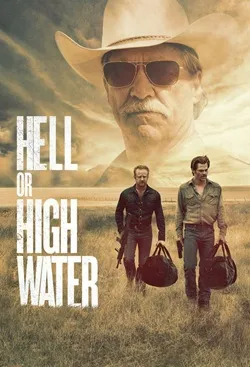
Hell or High Water is a fascinating retelling of classic Western films. The film tells the story of two brothers–Toby (Chris Pine) and Tanner (Ben Foster)–as they rob a series of banks to accumulate enough money to pay off the mortgage and back taxes on a family farm. They are pursued by Texas Rangers Marcus Hamilton (Jeff Bridges) and Alberto Parker (Gil Birmingham).
The film, like other Westerns, is fundamentally about the passage of time. While so many other films tell a mythologized narrative about the “passing of the West” from indigenous hands into that of white settlers, Hell or High Water depicts the collapse of prosperous economic institutions and white supremacy in the region. Instead of living good lives, all characters are suffering economically: the two main characters, the waitresses at diners, police officers, and more. Additionally, once-active settlements have become ghost towns, as large parts of the population have departed in search of eocnomic opportunity. Those who remain struggle to make ends’ meet. All the while, banks prey on those most in need, and oil companies pay rent to anyone with access to land–most often the banks’ after they foreclose on the properties of those who are most indebted.
At the same time, there is serious racial tension at play. Marcus, who is white and nearing retirement, sees himself as a modern day cowboy accompanied by his indigenous companion, Alberto. Through much of the film, Marcus “toys” with Alberto through racial stereotypes and jabs. Alberto, while visibly uncomfortable with Marcus’s behavior, also recognizes that the age of white supremacy is coming to an end, and Marcus is simply trying to preserve a fantasy. When Alberto is killed, nobody is more enraged than Marcus, who rapidly avenges him.
Finally, the film exposes the violence at the heart of American society. Toby wishes to conduct all of his bank robberies without killing anybody, but Tanner’s recklessness results in a gunfight between the brothers and countless men who see themselves as heroes.
The acting in the film is excellent, and the film is a solid tribute to the Western genre as a whole. At the same time, the film’s pacing is slow, and it gives the viewer an opportunity to reflect on its themes. The themes certainly take time to digest: the view it presents of the United States is pessimistic, although nowhere near as much as Cormac McCarthy’s in No Country for Old Men.